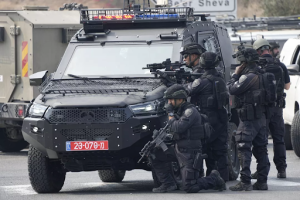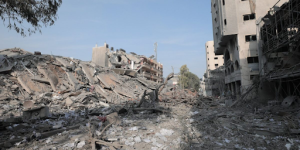On the morning of Saturday, October 7th, Hamas, a Palestinian political and militant terrorist organization, launched an attack on Israel. Hundreds of Hamas fighters invaded the heavily guarded Israeli border via ground, air, land, and sea, and thousands of rockets were fired from Gaza into Israel. As of Monday, October 9th, there were 900 dead and 2500 more wounded Israeli citizens from the events of Saturday, said Israeli officials. The effects of these events are ongoing, and similar events are still taking place. Although surprising and unnecessarily violent, these attacks may not be unjustified on the Palestinians’ side.

Conflict has been brewing and carried out in the Middle East for decades. After WWII, in 1947, The United Nations adopted the Resolution Plan, partitioning the area from the British Mandate of Palestine into Jewish and Arab states. The next thirty years following this were filled with a great deal of conflict and wars that displaced thousands of people until 1979 when Egypt and Israel signed the Camp David Accords, a peace treaty that ended the thirty years of conflict between Israel and Egypt. Although the Camp David Accords allowed for a breath of peace, it didn’t last. Soon after, in 1987, came the first intifada, and later, in 2000, the second intifada; these were planned Palestinian attacks on the Israeli government, land, and people. These attacks were the start of the central conflict that is now seen between Israel and Palestine today. In 2006, Hamas gained control over the Gaza Strip and West Bank, a small piece of land that borders the Mediterranean Sea and Egypt, and they remain in control of this land to this day.
Although Israel has tried to negotiate to end this conflict as peacefully as possible, Hamas has refused on numerous accounts. Israel’s primary goal since the end of WWII was to be recognized as a Jewish State. Israel’s main request translates into Palestine’s central issue. Israel was formed from Palestinian territory in 1948; this single request has caused so much of the conflict seen throughout the decades as Israel has continued to seize more territory in the region.
But over the past twenty years, this region has been torn with conflict, as have the decades before. Many lives had been lost over the years, more wounded, and so many hurt from being involved directly or indirectly by losing loved ones. However, the October 7th attack was different. It was a complete surprise to Israel.

Israel is known to have one of the world’s largest and most sophisticated militaries and intelligence programs. However, in this case, this did not help them. Hamas was able to plan and execute this attack fully under their radar. They attacked a music festival, cities, and a hospital, all filled with civilians on the initial attacks on Saturday, killing thousands of citizens and injuring many more. On Sunday, the prime Minister of Israel, Benjamin Netanyahu, declared war on Hamas, simply stating, “They started it, we will finish it.” Netanyahu stays true to his word as Israel has struck 450 targets in Gaza, Hamas-controlled land, within days after the initial attack. Unfortunately, this is barely the beginning and not nearly the end of this conflict, as many countries that aren’t in the area have to choose sides as to whom they support, bringing this conflict to a larger scale.
The events from Saturday, October 7th, will have lasting effects and continue to be drawn out. But, it is essential to stay updated on ongoing events and fully understand the extent of the situation.
Dr. Laura Astorian (Social Studies) expresses her distraught with the events of October 7th, especially with the loss of life, stating, “From what I’ve read, it was probably the single largest one-day loss of life in Israeli history.”
Mr. Sean Kurkjian (Social Studies) also voices his concern about the future as countries that aren’t directly involved may have to be forced to choose sides. How this will affect different international relations between nations: “But I think it is going to divide different countries, like you pick your side.”
All interviewees continue to express great concern not only for the current events but also for what will come from them. In conclusion, the recent events in Israel and Gaza are not slowing down, as neither side is willing to budge or negotiate peace. As this fighting continues, it is crucial to stay in the know with the ongoing updates.




